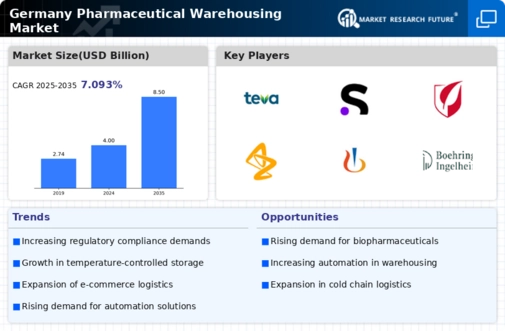The competitive dynamics within the
pharmaceutical warehousing market in Germany are characterized by a blend of innovation, strategic partnerships, and a focus on operational efficiency. Key players such as DHL Supply Chain (DE), Kuehne + Nagel (DE), and DB Schenker (DE) are at the forefront, each employing distinct strategies to enhance their market positioning. DHL Supply Chain (DE) emphasizes digital transformation and automation in its warehousing operations, aiming to streamline processes and improve service delivery. Kuehne + Nagel (DE) focuses on sustainability initiatives, integrating eco-friendly practices into its logistics solutions, which resonates well with the increasing demand for environmentally responsible operations. Meanwhile, DB Schenker (DE) is actively pursuing regional expansion, enhancing its footprint in key markets to better serve its clients. Collectively, these strategies contribute to a competitive environment that is increasingly driven by technological advancements and customer-centric solutions.
The market structure appears moderately fragmented, with several players vying for market share. Key business tactics such as localizing manufacturing and optimizing supply chains are prevalent among these companies. This fragmentation allows for a diverse range of services and solutions, catering to the specific needs of pharmaceutical clients. The collective influence of these major players shapes the market, as they continuously adapt to evolving regulatory requirements and customer expectations.
In November 2025, DHL Supply Chain (DE) announced the launch of a new automated warehousing facility in Frankfurt, designed specifically for pharmaceutical products. This facility utilizes advanced robotics and AI-driven inventory management systems, which are expected to enhance operational efficiency and reduce lead times. The strategic importance of this move lies in its potential to significantly improve service levels and responsiveness to market demands, positioning DHL as a leader in the sector.
In December 2025, Kuehne + Nagel (DE) unveiled a partnership with a leading pharmaceutical manufacturer to develop a sustainable logistics solution that minimizes carbon emissions throughout the supply chain. This collaboration is indicative of the growing trend towards sustainability in logistics, as companies seek to align their operations with environmental goals. The strategic significance of this partnership is profound, as it not only enhances Kuehne + Nagel's service offerings but also strengthens its reputation as a responsible logistics provider.
In January 2026, DB Schenker (DE) expanded its cold chain logistics capabilities by acquiring a specialized logistics firm focused on temperature-sensitive pharmaceuticals. This acquisition is expected to bolster DB Schenker's ability to meet the stringent requirements of the pharmaceutical industry, particularly in the context of increasing demand for biologics and other temperature-sensitive products. The strategic importance of this acquisition lies in its potential to enhance service reliability and expand market reach, thereby solidifying DB Schenker's competitive position.
As of January 2026, current trends in the pharmaceutical warehousing market are heavily influenced by digitalization, sustainability, and the integration of AI technologies. Strategic alliances are increasingly shaping the competitive landscape, as companies recognize the value of collaboration in addressing complex supply chain challenges. Looking ahead, it is likely that competitive differentiation will evolve, shifting from traditional price-based competition to a focus on innovation, technological advancements, and supply chain reliability. This transition underscores the necessity for companies to adapt and innovate in order to maintain a competitive edge in a rapidly changing market.

























